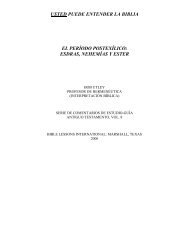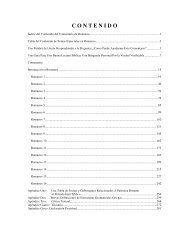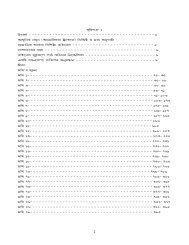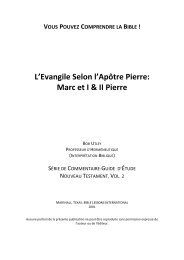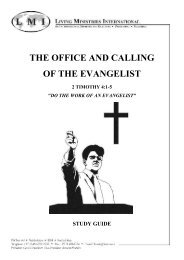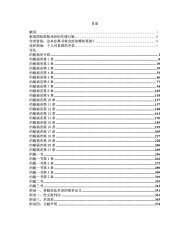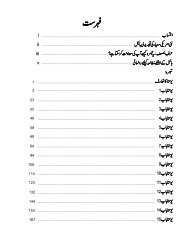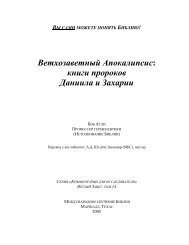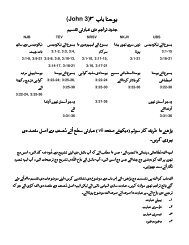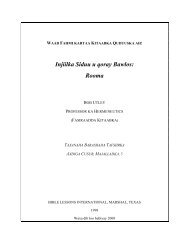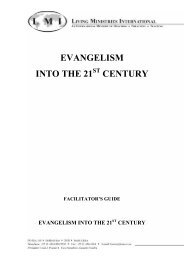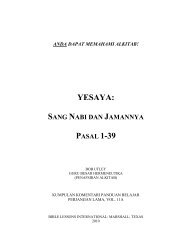The Prophet and His Day: Isaiah 1-39 - Free Bible Commentary
The Prophet and His Day: Isaiah 1-39 - Free Bible Commentary
The Prophet and His Day: Isaiah 1-39 - Free Bible Commentary
You also want an ePaper? Increase the reach of your titles
YUMPU automatically turns print PDFs into web optimized ePapers that Google loves.
2. In the OT the enemies of God’s people are the surrounding nations of the Ancient Near East, but in the NT theyhave been exp<strong>and</strong>ed to all unbelieving, anti-God, Satanically-inspired people. <strong>The</strong> battle has moved from ageographical, regional conflict to a worldwide, cosmic conflict (cf. Colossians).3. <strong>The</strong> promise of a l<strong>and</strong> which is so integral in the OT (the Patriarchal promises of Genesis, cf. Gen. 12:7; 13:15;15:7,15; 17:8) has now become the whole earth. New Jerusalem comes down to a recreated earth, not the NearEast only or exclusively (cf. Rev. 21-22).4. Some other examples of OT prophetic concepts being exp<strong>and</strong>ed area. the seed of Abraham is now the spiritually circumcised (cf. Rom. 2:28-29)b. the covenant people now include Gentiles (cf. Hos. 1:10; 2:23, quoted in Rom. 9:24-26; also Lev. 26:12;Exod. 29:45, quoted in II Cor. 6:16-18 <strong>and</strong> Exod. 19:5; Deut. 14:2, quoted in Titus 2:14)c. the temple is now Jesus (cf. Matt. 26:61; 27:40; John 2:19-21) <strong>and</strong> through Him the local church (cf. I Cor.3:16) or the individual believer (cf. I Cor. 6:19)d. even Israel <strong>and</strong> its characteristic descriptive OT phrases now refer to the whole people of God(i.e.,“Israel,” cf. Rom. 9:6; Gal. 6:16, i.e.,“kingdom of priests,” cf. I Pet. 2:5, 9-10; Rev. 1:6)<strong>The</strong> prophetic model has been fulfilled, exp<strong>and</strong>ed, <strong>and</strong> is now more inclusive. Jesus <strong>and</strong> the Apostolic writers do notpresent the end-time in the same way as the OT prophets (cf. Martin Wyngaarden, <strong>The</strong> Future of <strong>The</strong> Kingdom in Prophecy<strong>and</strong> Fulfillment). Modern interpreters who try to make the OT model literal or normative twist the Revelation into a veryJewish book <strong>and</strong> force meaning into atomized, ambiguous phrases of Jesus <strong>and</strong> Paul! <strong>The</strong> NT writers do not negate the OTprophets, but show their ultimate universal implication. <strong>The</strong>re is no organized, logical system to Jesus’ or Paul’s eschatology.<strong>The</strong>ir purpose is primarily redemptive or pastoral.However, even within the NT there is tension. <strong>The</strong>re is no clear systemization of eschatological events. In many waysthe Revelation surprisingly uses OT allusions in describing the end instead of the teachings of Jesus (cf. Matt. 24; Mark 13)!It follows the literary genre initiated by Ezekiel, Daniel, <strong>and</strong> Zechariah, but developed during the intertestamental period(Jewish apocalyptic literature). This may have been John’s way of linking the Old <strong>and</strong> New Covenants. It shows the age-oldpattern of human rebellion <strong>and</strong> God’s commitment to redemption! But it must be noted that although Revelation uses OTlanguage, persons, <strong>and</strong> events, it reinterprets them in light of first century Rome (cf. Rev. 1:7).SECOND TENSION (monotheism vs. an elect people)<strong>The</strong> biblical emphasis is on one personal, spiritual, creator-redeemer, God (cf. Exod. 8:10; Isa. 44:24; 45:5-7,14,18,21-22; 46:9; Jer. 10:6-7). <strong>The</strong> OT’s uniqueness in its own day was its monotheism. All of the surrounding nations werepolytheists. <strong>The</strong> oneness of God is the heart of OT revelation (cf. Deut. 6:4). Creation is a stage for the purpose offellowship between God <strong>and</strong> mankind, made in <strong>His</strong> image <strong>and</strong> likeness (cf. Gen.1:26-27). However, mankind rebelled,sinning against God’s love, leadership, <strong>and</strong> purpose (cf. Gen. 3). God’s love <strong>and</strong> purpose was so strong <strong>and</strong> sure that Hepromised to redeem fallen humanity (cf. Gen. 3:15)!<strong>The</strong> tension arises when God chooses to use one man, one family, one nation to reach the rest of mankind. God’selection of Abraham <strong>and</strong> the Jews as a kingdom of priests (cf. Exod. 19:4-6) caused pride instead of service, exclusion insteadof inclusion. God’s call of Abraham involved the intentional blessing of all mankind (cf. Gen. 12:3). It must be remembered<strong>and</strong> emphasized that OT election was for service, not salvation. All Israel was never right with God, never eternally savedbased solely on her birthright (cf. John 8:31-59; Matt. 3:9), but by personal faith <strong>and</strong> obedience (cf. Gen. 15:6, quoted inRom. 4). Israel lost her mission (the church is now a kingdom of priests, cf. 1:6; II Pet.2:5,9), turned m<strong>and</strong>ate into privilege,service into a special st<strong>and</strong>ing! God chose one to choose all!THIRD TENSION (conditional covenants vs. unconditional covenants)<strong>The</strong>re is a theological tension or paradox between conditional <strong>and</strong> unconditional covenants. It is surely true that God’sredemptive purpose/plan is unconditional (cf. Gen. 15:12-21). However, the m<strong>and</strong>ated human response is alwaysconditional!<strong>The</strong> “if. . .then” pattern appears in both OT <strong>and</strong> NT. God is faithful; mankind is unfaithful. This tension has causedmuch confusion. Interpreters have tended to focus on only one “horn of the dilemma,” God’s faithfulness or human effort,God’s sovereignty or mankind’s free will. Both are biblical <strong>and</strong> necessary.This relates to eschatology, to God’s OT promises to Israel. If God promises it, that settles it! God is bound to <strong>His</strong>promises; <strong>His</strong> reputation is involved (cf. Ezek. 36:22-38). <strong>The</strong> unconditional <strong>and</strong> conditional covenants meet in Christ (cf.Isa. 53), not Israel! God’s ultimate faithfulness lies in the redemption of all who will repent <strong>and</strong> believe, not in who was yourfather/mother! Christ, not Israel, is the key to all of God’s covenants <strong>and</strong> promises. If there is a theological parenthesis in the<strong>Bible</strong>, it is not the Church, but Israel (cf. Acts 7 <strong>and</strong> Gal. 3).44



